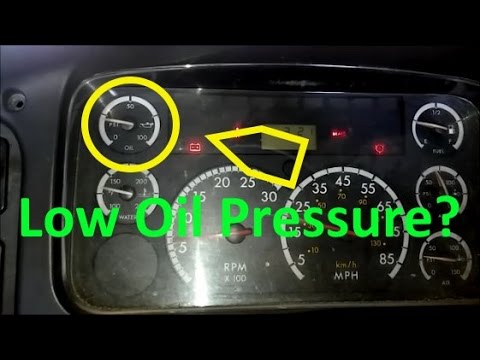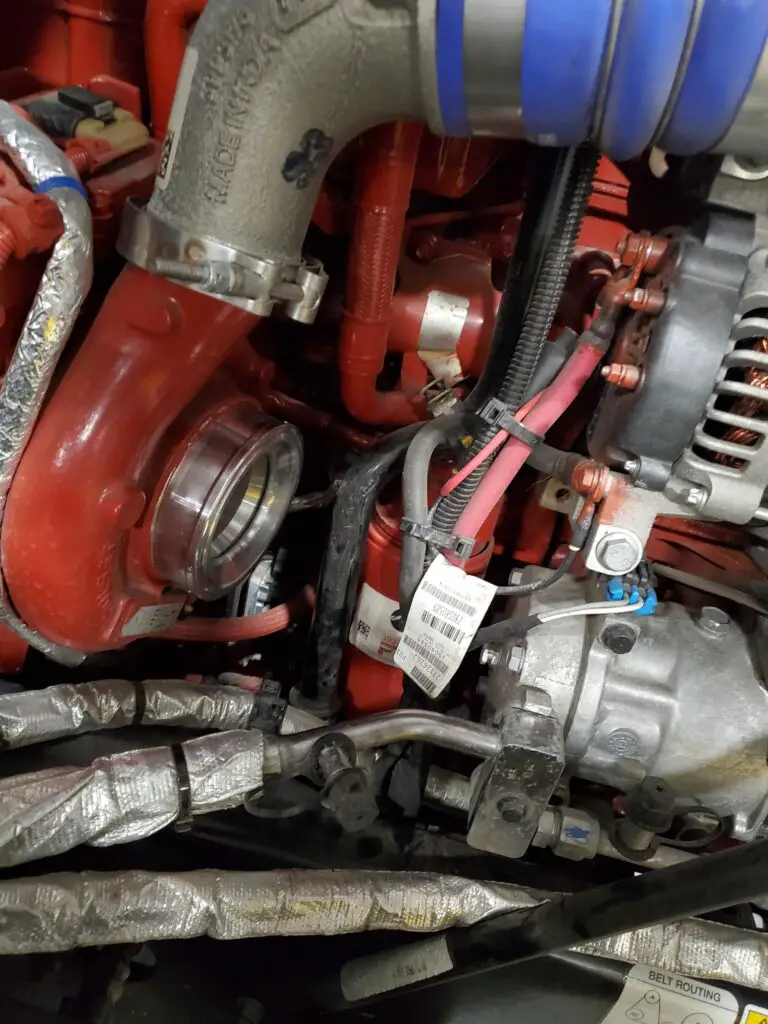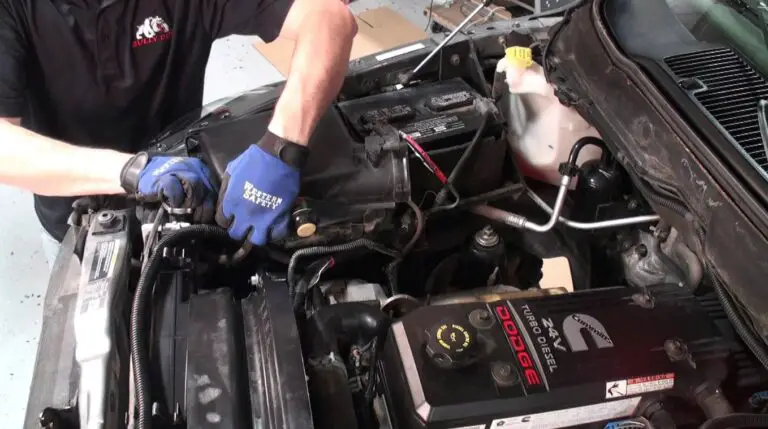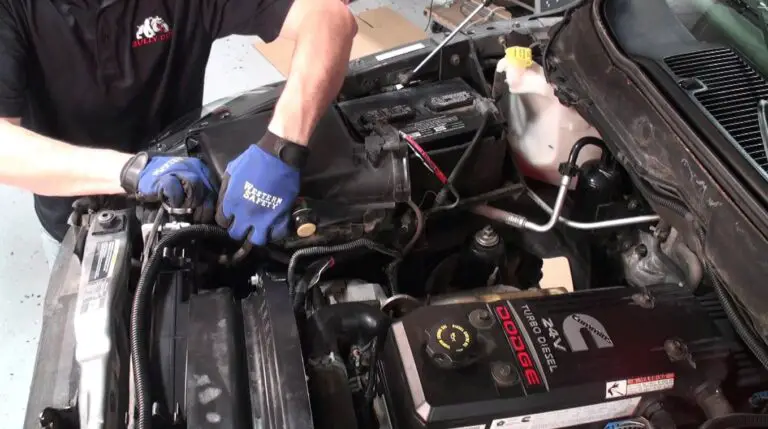6.7 Cummins Timing Cover Leak: Fix it Fast!
If you have a 6.7 Cummins with a timing cover leak, it is crucial to address it immediately to avoid significant internal engine damage. Ignoring a timing cover leak can have serious consequences for your engine’s health.
Common Symptoms Of A Timing Cover Leak
A timing cover leak can cause serious damage to your engine if left untreated. One common symptom of a timing cover leak is engine oil leakage. This can be seen as oil stains or pools underneath the vehicle. It is important to address this issue promptly as low oil levels can lead to engine damage.
Another symptom of a timing cover leak is a low oil level. If you constantly need to top up your oil, it could indicate a leak in the timing cover. This is because the oil is leaking out and not being properly contained within the engine.
Lastly, a timing cover leak can also cause engine belt slippage. When oil from the leak comes into contact with the engine belt, it can cause the belt to degrade and slip on the pulleys it drives. This can lead to further problems and potentially leave you stranded on the road.
Causes Of Timing Cover Leaks
A leaking timing cover can cause severe damage to the engine. It is important to address this issue as it can lead to low oil levels and engine belt degradation. Keep an eye on oil leaks to prevent further damage.
| Causes of Timing Cover Leaks |
|---|
|
Repairing A Timing Cover Leak
When it comes to repairing a timing cover leak, there are a few steps you can take to ensure a successful fix. The first step is cleaning off any oil residue from the timing cover and surrounding area. Use a degreaser and a clean cloth to remove any oil buildup. This will help you identify the source of the leak more easily.
Once the area is clean, carefully inspect the timing cover for any cracks or other signs of damage. If you find any, you may need to replace the timing cover altogether. However, if the cover is in good condition, you can proceed with resealing it.
Start by applying a thin layer of gasket maker or silicone sealant to the mating surface of the timing cover. Make sure to evenly coat the surface to ensure a proper seal. Then, carefully reinstall the timing cover and tighten the bolts according to the manufacturer’s specifications.
After the cover is securely in place, allow the sealant to cure for the recommended amount of time. Finally, check for any oil leaks and monitor the area for any signs of further leakage.

Credit: www.amazon.com
Step-by-step Guide To Resealing The Timing Cover
To reseal the timing cover on a 6.7 Cummins engine, follow these step-by-step instructions. First, drain the engine oil to prevent any leaks during the process. Then, remove the accessory drive pulley to gain access to the timing cover. Next, disconnect the timing cover bolts and carefully remove the cover. Make sure to clean the sealing surfaces thoroughly to ensure a proper seal. Once clean, apply a new gasket and sealant to the timing cover and reattach it to the engine block. Finally, reinstall the timing cover and accessories and refill the engine oil to the appropriate level. Following these steps will help prevent any timing cover leaks and ensure the proper functioning of the engine.
Tips For Preventing Future Timing Cover Leaks
Regularly inspecting the timing cover is essential for preventing future leaks. By inspecting the cover, you can identify any signs of damage or wear and take timely action. If you notice any leaks, it is important to replace the seals and gaskets as needed. This will help to prevent further leakage and ensure proper functioning of the timing cover. Additionally, make sure to properly torque the timing case bolts during installation. This will help to secure the cover tightly and prevent any potential leaks. By following these tips, you can minimize the risk of timing cover leaks and ensure the longevity of your engine.
When To Seek Professional Help
A leaking timing cover is a serious issue that should not be ignored. It can cause extensive damage to the internal components of the engine. If you notice any signs of a timing cover leak, such as oil spots on the ground or a low oil level, it is important to seek professional help immediately.
Attempting to repair a timing cover leak without the proper tools or experience can lead to further damage to the engine. It is best to leave this job to the experts who have the knowledge and expertise to fix the issue correctly.
Additionally, repairing a timing cover leak takes time and resources. If you don’t have the time or the necessary resources to dedicate to the repair, it is best to consult with a professional who can handle the job efficiently.
Remember, a leaking timing cover is not something to be taken lightly. It is a problem that should be addressed as soon as possible to prevent further damage to your engine.
The Consequences Of Ignoring A Timing Cover Leak
The consequences of ignoring a timing cover leak
A timing cover leak may seem like a minor issue, but ignoring it can lead to severe internal engine damage. When the timing cover leaks, it can allow oil to leak onto the engine belt. This can result in the engine belt slipping on the pulleys it drives, causing engine performance issues and potentially leaving you stranded.
Additionally, a timing cover leak can lead to costly repairs or even engine replacement. The oil from the leak can degrade the engine belt quickly, requiring it to be replaced. Furthermore, if the timing cover leak is left untreated, the oil can seep into the internal components of the engine, causing damage and reducing its lifespan. This could result in expensive repairs or the need for a completely new engine.
Frequently Asked Questions On 6.7 Cummins Timing Cover Leak
How Serious Is A Leaking Timing Cover?
A leaking timing cover is a major concern because it can cause significant damage to the engine. Ignoring it can lead to internal engine damage. Additionally, the oil from the leak can damage the engine belt and cause it to slip on the pulleys, potentially leaving you stranded and damaging the engine.
Fixing the timing cover is recommended.
What Is The Common Oil Leak On A 6.7 Cummins?
The common oil leak on a 6. 7 Cummins is from the timing cover, specifically from the timing case bolts, timing cover gasket, front seal, or timing gear case. It’s important to address this issue promptly to prevent engine damage and belt slippage.
Is A Timing Cover Oil Leak Serious?
Yes, a timing cover oil leak is a serious issue. It can lead to severe internal engine damage and may cause the engine belt to slip, leaving you stranded. The oil can also degrade the engine belt quickly. It is important to address this problem promptly to prevent further damage to your engine.
How Much Is A Timing Cover Reseal?
Timing cover reseal cost varies, but it is typically between $200 and $500.
Conclusion
A leaking timing cover is not something to take lightly, as it can lead to significant damage to your engine. Ignoring this issue can result in severe internal engine damage, which can be costly to repair. It’s important to address the problem promptly to avoid further complications.
If you notice any signs of a timing cover leak, such as oil leaks or low oil levels, it is recommended to take your vehicle to a professional mechanic for inspection and repair. By doing so, you can ensure the longevity and performance of your engine.







